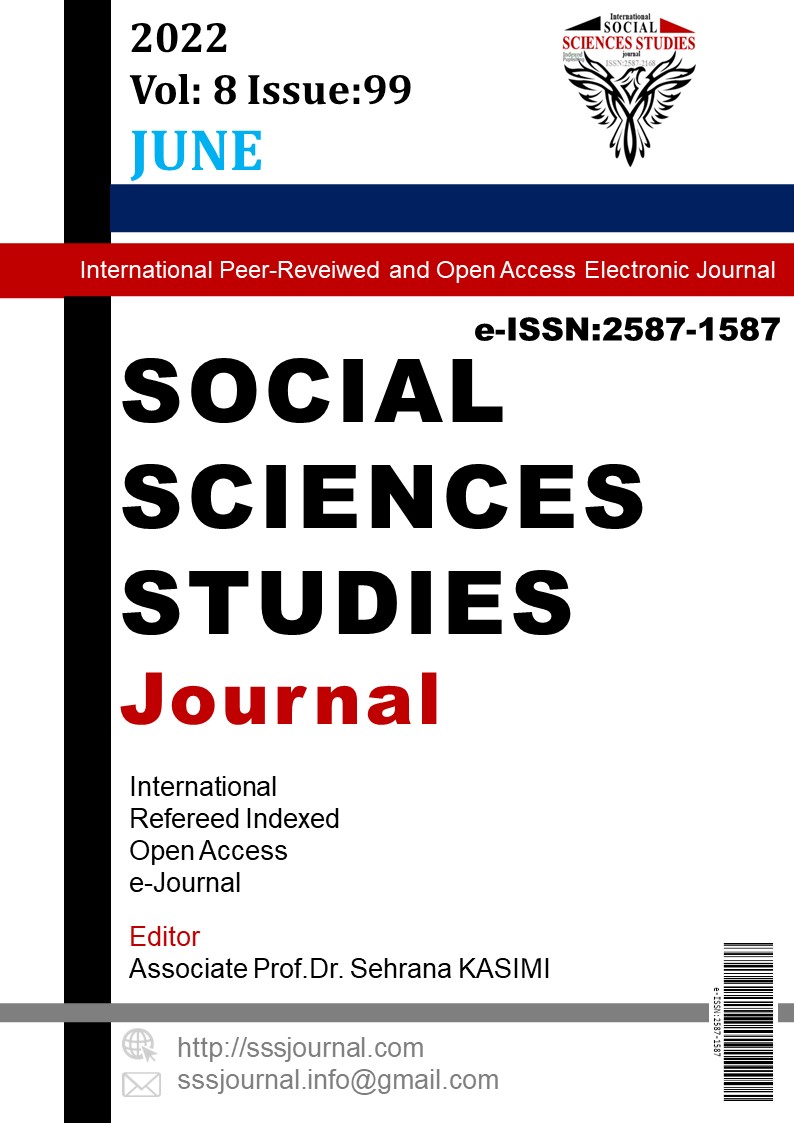Özel Eğitim Öğretmenlerin Mesleki Benlik Saygısı Ve Umut Düzeylerinin Demografik Özelliklere Göre İncelenmesi
Author :
Abstract
Bu araştırmanın amacı özel eğitim öğretmenlerin mesleki benlik saygısı ile umut düzeyleri arasındaki ilişkinin bazı demografik özelliklere göre incelenmesidir. Özel eğitim alanında çalışan öğretmenlerin mesleki benlik saygıları ile umut düzeylerinin cinsiyet, medeni durum, yaş açısından anlamlı bir farklılığın olup olmadığı incelenmiştir. Araştırma modeli olarak ilişkisel tarama modeli kullanılmıştır. Araştırma grubu resmi okul ve özel eğitim ve rehabilitasyon merkezlerinde özel eğitim alanında çalışan 228 öğretmenlerden oluşmaktadır. Verilerin toplanmasında kişisel bilgi formu, mesleki benlik saygısı ve umut düzeyi ölçekleri kullanılmıştır. Araştırma sonucunda mesleki benlik saygısının demografik açıdan cinsiyet değişkeninde, kadınlar lehinde anlamlı farklılık görülmüştür. Mesleki benlik saygısının medeni durum ve yaşa göre anlamlı farklılık görülmemiştir. Umut düzeylerinde ise demografik açıdan anlamlı bir farklılık görülmemiştir.
Keywords
Abstract
The aim of this study is to examine the relationship between professional self-esteem and hope levels of special education teachers according to some demographic characteristics. It was investigated whether there is a significant difference between the professional self-esteem and hope levels of teachers working in the field of special education in terms of gender, marital status and age. The relational survey model was used as the research model. The research group consists of 228 teachers working in the field of special education in public schools and special education and rehabilitation centers. Personal information form, professional self-esteem and hope level scales were used to collect data. As a result of the research, there was a significant difference in favor of women in the demographically gender variable of professional self-esteem. There was no significant difference in professional self-esteem according to marital status and age. There was no significant demographic difference in hope levels.
Keywords
- Akman, Y. & Korkut, F. (1993). ‘‘Umut Ölçeği Üzerine Bir Çalışma’’, Hacettepe Üniversitesi Eğitim Fakültesi
- Akman, Y. & Korkut, F. (1993). ‘‘Umut Ölçeği Üzerine Bir Çalışma’’, Hacettepe Üniversitesi Eğitim Fakültesi Dergisi, 9: 193-202.
- Arıcak, O.T. (1999). ‘‘Öğretmen Adaylarının Benlik Algısı Ve Mesleki Benlik Algılarının Geliştirilmesine YönelikBir Grupla Psikolojik Danışma Uygulaması’’, M.Ü. Atatürk Eğitim Fakültesi Eğitim Bilimleri Dergisi, 11: 11-22
- Arıcak, T. & Dilmaç, B. (2003). ‘‘Psikolojik Danışma ve Rehberlik Öğrencilerinin BirTakım DeğişkenlerAçısından Benlik Saygısı ile Mesleki Benlik Saygısı Düzeylerinin İncelenmesi’’, Trakya Üniversitesi Sosyal Bilimler Dergisi, 3 (1): 1-8.
- Atik, G. & Kemer, G., (2009). ‘‘Psychometric Properties of Children’s Hope Scale: Validity and Reliability Study’’, Elementary Education Online, 8(2).
- Aydın, B. (2010). ‘‘Üniversite öğrencilerinin duygusal zeka ve umut düzeyleri ile psikolojik sağlamlıklarıarasındaki ilişkinin incelenmesi’’, Yüksek Lisans Tezi, Karadeniz Teknik Üniversitesi Sosyal Bilimler Enstitüsü, Trabzon.
- Baymur, F. (1972). Genel Psikoloji, (15. baskı), İnkılap Kitabevi, İstanbul.
- Dündar, S. (2008). ‘‘Polislerin Umutsuzluk Düzeyi ile Problem Çözme Becerisi Arasındaki İlişkinin İncelenmesi’’, Polis Bilimleri Dergisi, 10 (3): 77-92.
- Efilti, E. & Çıkılı, Y . (2017). ‘‘Özel Eğitim Bölümü Öğrencilerinin Benlik Saygısı İle Mesleki Benlik Saygısının İncelenmesi’’, Abant İzzet Baysal Üniversitesi Eğitim Fakültesi Dergisi, 17 (1): 99-114.
- Gündem, Z.F., (2009). ‘‘İlköğretim Okulu Öğretmenlerinin Motivasyon, Mesleki Benlik Saygısı ve MesleğeYönelik Yetkinlik Duygusu Algıları Arasındaki Etkileşim’’, Yüksek Lisans Tezi, Yeditepe Üniversitesi, İstanbul.
- Gürsoy, C.G., (1989). ‘‘İlkokul Öğretmenlerinin Benlik Kavramları İle Mesleki Benlik Kavramları ArasındakiBağdaşım Düzeyini Etkileyen Bazı Faktörler’’, Yüksek Lisans Tezi, Uludağ Üniversitesi Sosyal Bilimler Enstitüsü, Bursa.
- Irmak, M. (2015). ‘‘İlkokul Ve Ortaokul Öğretmenlerinin Mesleki Benlik Saygılarının Belirlenmesi, Yüksek Lisans Tezi, Sabahatin Zaim Üniversitesi Sosyal Bilimler Enstitüsü, İstanbul.
- Kadıoğlu, F. (2014). ‘‘Psikolojik Danışmanların (Rehber Öğretmenlerin) Mesleki Doyum İle Kendine SaygılarıArasındaki İlişkinin İncelenmesi’’, Yüksek Lisans Tezi, Marmara Üniversitesi Eğitim Bilimleri Enstitüsü, İstanbul. Karasar, N. (2012). Bilimsel Araştırma Yöntemi, Nobel, Ankara.
- Kiziroğlu, M. (2012). ‘‘Sınıf Öğretmenlerinin Sosyodemografik Özelliklere Göre Umutsuzluk Düzeyleri’’, Yüksek Lisans Tezi, Atatürk Üniversitesi Eğitim Bilimleri Enstitüsü, Erzurum.
- Kuzgun, Y. (1983). “Benlik ve İdeal Benlik Kavramlarının, Tercih Edilen Meslek Kavramlarıyla İlişkisi”, Ankara Üniversitesi Eğitim Bilimleri Fakültesi Dergisi, 16 (1).
- Küsgülü, Ü. (2014). ‘‘Üniversite Öğrencilerinin Mutluluk, Umut Ve Narsisizm Düzeylerinin İncelenmesi’’, Yüksek Lisans Tezi, Gaziosmanpaşa Üniversitesi Eğitim Bilimleri Enstitüsü, Tokat.
- Ottekin, N. (2009). ‘‘Ailelerinden Ayrı Olarak Öğrenim Görmekte Olan Üniversite Öğrencilerinin Benlik SaygısıVe Umutsuzluk Düzeylerinin İncelenmesi’’, Yüksek Lisans Tezi, Selçuk Üniversitesi Sosyal Bilimler Enstitüsü, Konya.
- Özkan, İ. (1994). Benlik Saygısını Etkileyen Etkenler. Düşünen Adam, 7(3), 4-9.
- Sağdıç, M., (2005). ‘‘Öğrencilerin Meslek Lisesi Tercihini Etkileyen Etmenler ve Umut Düzeyleri’’, Yüksek Lisans Tezi, Sakarya Üniversitesi Eğitim Bilimleri Enstitüsü, Sakarya.
- Sönmez. A. (2013). ‘‘İlk ve Ortaokullardaki Öğretmenlerin Benlik Saygılarının Mesleki Tükenmişliğe Etkisi’’, Yüksek Lisans Tezi, Marmara Üniversitesi. İstanbul.
- Toprak, Ş. (2007). ‘‘İlköğretim Okulu Yöneticilerinin Yaşam Değerleri İle Mesleki Benlik Saygıları Arasındaki İlişkinin İncelenmesi’’, Yüksek Lisans Tezi, Yeditepe Üniversitesi Sosyal Bilimler Enstitüsü, İstanbul.
- Üstün, E.; Erkan, S. & Akman, B. (2004). ‘‘Türkiye'de Okul Öncesi Öğretmenliği Öğrencilerinin Öğretmenlik Mesleğine Yönelik Tutumlarının İncelenmesi’’, Sosyal Bilimler Dergisi, 10: 129-136.
- Vahapoğlu, Z. (2013). ‘‘Ön Lisans Öğrencilerinin Umut Düzeyleri Ve Başarı Yönelimlerinin Bazı Değişkenler Açısından İncelenmesi’’, Yüksek Lisans Tezi, Sakarya Üniversitesi Eğitim Bilimleri Enstitüsü, Sakarya.
- Yerebakan, H.B. (2007). ‘‘Resmi İlköğretim Okullarında Görev Yapan Eğitim Yöneticilerinin Benlik Saygısı veDenetim Odağı Düzeyleri Arasındaki İlişkinin İncelenmesi’’, Yüksek Lisans Tezi, Yeditepe Üniversitesi, Sosyal Bilimler Enstitüsü, İstanbul.
- Yıldırım, Y.; Kırımoğlu, H. & Temiz, A. (2010). ‘‘Beden Eğitimi ve Spor Öğretmenlerinin Mesleki Benlik Saygısı Düzeylerinin İncelenmesi (Hatay İl Örneği)’’, Beden Eğitimi ve Spor Bilimleri Dergisi, 4(1): 88-97.
- Zoroğlu, Ö. (2014). ‘‘Okul Öncesi Öğretmenlerinin Mesleğe Yönelik Tutumları, Mesleki Benlik Saygıları İle İş Doyumları Arasındaki İlişki’’, Yüksek Lisans Tezi, Karadeniz Teknik Üniversitesi, Trabzon.





